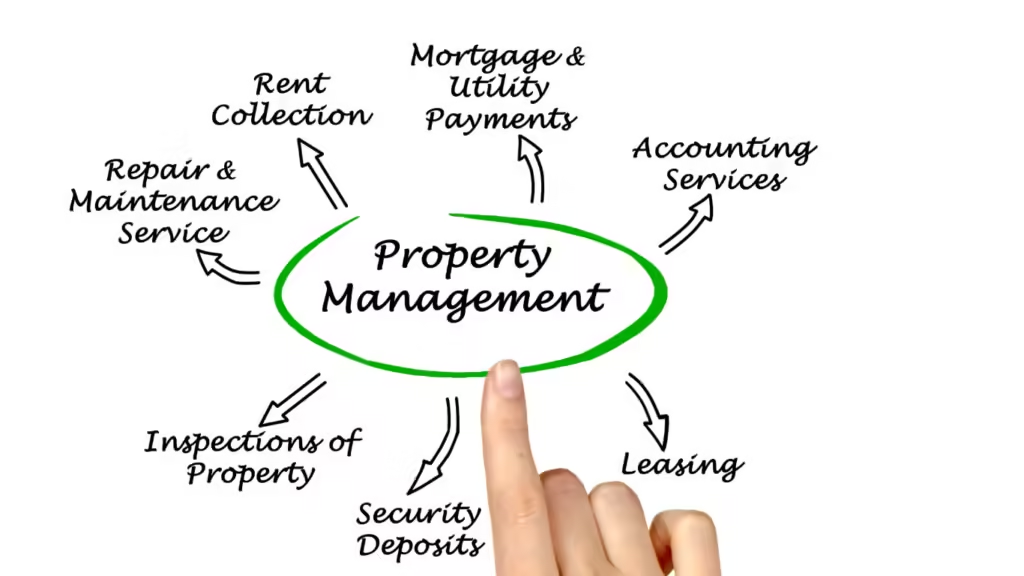An In-depth Look at Company Property Management: Key Roles and Functions Explained

Are you considering hiring a company property management but unsure about what they actually do? In this article, we will take an in-depth look at the key roles and functions of a property management company.
Managing properties can be a complex and time-consuming task, especially if you own multiple properties or live far away from your rental properties. This is where a property management company comes in. They act as a mediator between property owners and tenants, ensuring that both parties have a positive experience.
One of the main responsibilities of a company property management is to handle tenant screening and selection. They thoroughly evaluate potential tenants, checking their background, credit history, and references. This helps to ensure that only reliable and responsible tenants are selected for your property.
Additionally, company property management take care of rent collection, property maintenance, and handling tenant complaints and issues. They also market and advertise vacant rental units, minimizing downtime between tenants.
By entrusting the management of your property to professionals, you can have peace of mind knowing that your investment is in capable hands. Join us as we delve into the various roles and functions of a company property management, giving you a comprehensive understanding of their importance and benefits.
What Is Property Management?
Property management refers to the operation, control, and oversight of real estate properties on behalf of the owners. This can encompass a wide range of activities, from marketing rental units to maintaining the physical structure and managing tenant relations. Essentially, property management acts as an intermediary between the property owner and the tenants, ensuring that both parties are satisfied and that the property runs smoothly. With the growing complexities of property ownership, the role of property management has become increasingly vital in preserving property value and maximizing rental income.
Effective property management involves a diverse set of tasks that require a keen understanding of both real estate and customer service. Property managers must be adept at handling finances, including budgeting and accounting, while also being skilled in tenant relations to ensure a harmonious living environment. Their responsibilities often extend beyond simple management; they also serve as a resource for property owners, providing insights into market conditions, legal compliance, and property maintenance. This multifaceted role is essential for property owners who wish to maintain a profitable and well-managed investment.
In today’s market, where remote work and digital transactions have become commonplace, the need for professional property management is more pronounced than ever. Owners who may not reside near their properties or those who own multiple units often find themselves overwhelmed with the demands of property management. By outsourcing these responsibilities to a property management company, owners can focus on other aspects of their lives or expand their investment portfolios without the burden of daily management tasks.
Understanding Property Management

Understanding property management is crucial for both property owners and potential tenants. The concept revolves around the effective handling of rental properties, whether they are residential, commercial, or industrial. Property management companies typically employ a team of professionals who specialize in various areas, including leasing, maintenance, and financial management. These professionals work collaboratively to ensure the property operates efficiently and meets the needs of both owners and tenants.
One of the primary functions of property management is tenant screening and selection. This process involves evaluating potential tenants through background checks, credit history assessments, and reference checks. The goal is to find reliable tenants who will pay rent on time and take care of the property. A thorough screening process minimizes the risk of late payments and property damage, ultimately protecting the owner’s investment. Additionally, property management companies handle lease agreements, ensuring that all legal requirements are met and that both parties understand their rights and responsibilities.
Another critical aspect of property management is maintenance and repairs. Property managers coordinate regular inspections, oversee maintenance requests, and ensure that the property is in good condition. This proactive approach not only enhances tenant satisfaction but also helps preserve the property’s value over time. When issues arise, such as plumbing problems or electrical failures, property managers are responsible for addressing them promptly and efficiently, further solidifying their role as the main point of contact for both owners and tenants.
Types of Property Management:
Industrial Property Management
Industrial property management focuses on properties used for manufacturing, warehousing, or distribution. These types of properties often have unique requirements, including specialized maintenance and compliance with safety regulations. Property managers in this sector must be knowledgeable about industrial lease agreements, zoning laws, and environmental regulations. They work closely with tenants to ensure the facility meets their operational needs while also adhering to local and national laws.
The management of industrial properties involves a wide range of responsibilities, including site management, maintenance coordination, and tenant relations. Unlike residential properties, industrial tenants may require longer lease terms and more complex operating agreements, which means property managers must be adept at negotiating and drafting these documents. Additionally, property managers must stay updated on market trends affecting industrial spaces, such as shifts in logistics and supply chain management, to ensure that the property remains competitive and attractive to potential tenants.
Moreover, effective industrial property management can significantly impact a business’s overall performance. A well-maintained facility enhances operational efficiency, while timely maintenance can prevent costly downtimes. By leveraging their expertise, property managers can help industrial property owners maximize their investments and meet the evolving demands of the marketplace.

Commercial Property Management
Commercial property management encompasses a variety of property types, including office buildings, retail spaces, and mixed-use developments. The objectives in managing these properties differ from residential management, as commercial tenants often enter into longer leases and have more complex needs. Property managers in this sector must understand the nuances of commercial leasing, including net leases, percentage leases, and other financial arrangements that can affect both the landlord and the tenant.
One of the key functions of commercial property management is tenant relations. Building strong relationships with tenants is crucial for tenant retention, as turnover can be costly for property owners. Property managers must address tenant concerns, coordinate maintenance, and facilitate communication to ensure that tenants feel valued and heard. Additionally, they often play a role in marketing and leasing vacant spaces, which may involve staging the property, conducting showings, and negotiating lease terms.
Furthermore, the financial aspects of commercial property management are particularly intricate. Property managers are responsible for budgeting, financial reporting, and ensuring that the property generates a consistent return on investment. They must analyze market trends to set competitive rental rates and assess the financial health of the property regularly. This comprehensive understanding of both property management and finance is essential for maximizing the value of commercial real estate investments.
Residential Property Management
Residential property management focuses on managing rental properties, such as single-family homes, apartment complexes, and multi-family units. This type of management is perhaps the most recognizable, as it involves direct interactions with tenants and the handling of daily operations. Property managers in this sector are responsible for tenant screening, rent collection, maintenance coordination, and addressing tenant complaints or issues.
The tenant screening process in residential property management is particularly critical, as the quality of tenants can significantly impact the property’s profitability. Property managers employ various methods to assess potential tenants, including credit checks, employment verification, and interviews. A well-executed screening process helps ensure that tenants are reliable and responsible, reducing the likelihood of late payments or property damage.
Maintenance is another essential function of residential property management. Property managers must ensure that the property is well-maintained and that any repairs are addressed promptly. This includes routine inspections, overseeing maintenance staff or contractors, and maintaining communication with tenants regarding their maintenance requests. By prioritizing tenant satisfaction and property upkeep, residential property managers help create a positive living environment that encourages tenant retention and promotes the overall success of the rental business.

Special Property Management Considerations
When it comes to property management, certain special considerations can affect how a property is managed effectively. For instance, properties located in specific regions may face unique challenges, such as extreme weather conditions or local regulations that must be adhered to. Property managers must be well-versed in these local laws, ensuring compliance to avoid legal issues that could arise from negligence or oversight.
Another important consideration is the type of tenants the property attracts. For instance, properties aimed at students, families, or professionals may require different management strategies. Understanding the demographics of potential tenants helps property managers tailor their marketing efforts, lease agreements, and amenities to better meet the needs of those specific groups.
Additionally, technology plays an increasingly important role in property management. From online rent payment systems to maintenance request platforms, leveraging technology can enhance operational efficiency and improve tenant experiences. Property managers need to stay updated on the latest tools and trends, ensuring they can offer the best services while keeping operational costs down. This adaptability is crucial in a rapidly changing market where both tenants and owners expect a high level of service.
Who Needs a Property Manager?
Identifying who needs a property manager involves considering various factors related to property ownership and investment goals. First and foremost, individuals who own multiple properties or live far away from their rental units often benefit from hiring a property manager. Managing multiple rentals can be overwhelming, especially if they are located in different areas. A property management company can provide the necessary resources and expertise to ensure that all properties are well-maintained and that tenant relations are managed effectively.
Additionally, property owners who may not have the time or expertise to handle the complexities of property management can significantly benefit from professional assistance. Whether it’s dealing with tenant screening, maintenance requests, or legal matters, property managers bring a wealth of knowledge and experience to the table. This not only alleviates the burden from the owner but also enhances the likelihood of achieving a successful rental operation.
Moreover, real estate investors looking to expand their portfolios often rely on property managers to ensure that their investments are profitable. Experienced property managers can provide valuable insights into market trends, helping owners make informed decisions about property acquisitions or renovations. By leveraging the expertise of property management companies, investors can optimize their investments and focus on growth rather than day-to-day operations.
Who Benefits from Hiring a Property Manager?
The benefits of hiring a property manager extend beyond just property owners; tenants also experience advantages from professional management. For property owners, engaging a property management company can lead to increased efficiency in operations and improved financial performance. With experts handling tenant relations, maintenance, and financial oversight, owners can rest assured that their investment is being managed proficiently. This peace of mind allows them to focus on other ventures or enjoy their personal lives without the constant worry of property management.
Tenants benefit from having a dedicated professional responsible for their living conditions. A property manager can provide timely responses to maintenance requests, ensure that the property is well-maintained, and address any concerns tenants may have. This level of professionalism and attention to detail enhances the tenant’s experience, leading to higher satisfaction and retention rates. Happy tenants are more likely to renew their leases, reducing turnover and vacancy rates for property owners.
Furthermore, property managers can implement policies and procedures that promote a safe and secure living environment. This includes regular property inspections, adherence to safety regulations, and swift responses to tenant complaints. Tenants feel more at ease knowing that their property manager is actively monitoring and maintaining the property, which fosters a stronger sense of community. Overall, the relationship between property owners, management companies, and tenants plays a vital role in creating a successful rental experience for everyone involved.

Conclusion
In conclusion, company property management is an integral part of real estate ownership that offers a wide range of services to property owners and tenants alike. By understanding the key roles and functions of property management, it becomes clear how beneficial these companies can be in maintaining and enhancing property values. Whether it’s through tenant screening, rent collection, or property maintenance, property managers work diligently to ensure a smooth operation.
The various types of property management—industrial, commercial, and residential—each come with their unique challenges and requirements. By tailoring their approach to the specific needs of each property type, property managers can effectively address the diverse concerns of property owners and tenants. Moreover, recognizing special considerations such as technology and local regulations further enhances their ability to provide excellent service.
Ultimately, hiring a property management company can be a wise investment for those looking to maximize their real estate investments and ensure a positive experience for tenants. With the right professionals managing the property, owners can enjoy peace of mind and focus on their broader investment strategies, while tenants benefit from a well-maintained and professionally managed living environment. The value of effective property management cannot be overstated, as it serves as the backbone of a successful rental operation.


